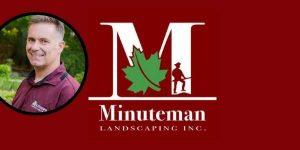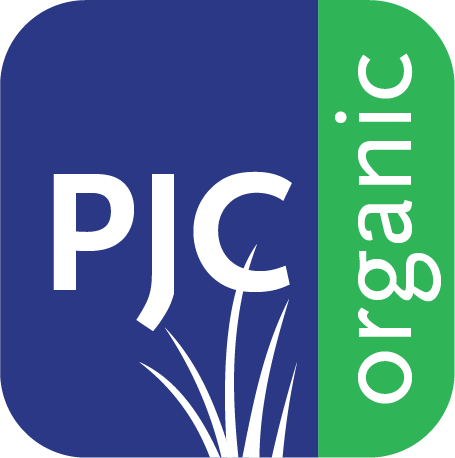Throughout the season, we are highlighting different PJC customer interviews to get their perspective on organic lawn care. Below is a recap of our time talking with Jim Agabedis Owner & President of Minuteman Landscaping, Concord, MA with a degree in Finance & Entrepreneurial Studies, is a NOFA AOLCP, MA Certified Horticulturist and Speaker on Organic Lawn Care. Jim has been a PJC customer for 19 years – WOW!
How did you get started in the landscape industry?
I started the business in 1984, while a sophomore at Babson College as a way to help pay for school and I’ve always loved landscaping. By my senior year, I had 360 clients. I would bring my truck and trailer to school, then after class, mow some lawns, prune some bushes, do a cleanup, go to baseball practice or hockey practice, and then home. The guys from the sports teams were my employees.
What services do you offer?
I’ve learned over the years that you can’t be all things to all people and serve them well—it dilutes your quality, especially if you are a small company. We currently offer – maintenance (mowing, cleanups, mulching, and pruning); lawn care (organic fertilization, seeding, aeration, etc.); plant health care; mosquito & tick control; and garden design and install). Minuteman subcontracts irrigation, masonry, & tree work. We have also gone totally electric with commercial mowers. This decision dovetails with the philosophy of our company, and the mowers are finally where they need to be, while string trimmers and blowers have a way to go in power and duration of use.
How did you get into organic land care?
I had a grandmother from Greece who was an organic gardener before she knew what it was. She grew produce on a 3,500sf lot in Brighton, MA and, I grew up helping her, and that’s where I got the concept of organic.
I started self-educating by taking classes, listening to speakers on the radio, wherever I could get information. I told my grandmother one day, ‘I found this miracle stuff that we can spray on our trees and we won’t get those worms.’ And she’s like, ‘Oh, great, can we drink it?’. And I said, ‘No, it’s a chemical’. She said, ‘Then why would we eat it?’ …and that’s where my preliminary philosophy on chemicals developed.
Down the line, I read an article called “Healthy Lawns Without Chemicals” and learned about the different carcinogens and ingredients that were in lawn care products. After that article, I put it together that this may not be as healthy of an environment to be working in as I once thought it was. So I told my clients that we couldn’t work for them if they were going to continue to use chemicals. I didn’t want to profit at the expense of my employees or my own health. To make a long story short – we went down to about 60 clients.
How has your business grown since committing to organic land care?
When we made the commitment to organic lawn care, the business continued to prosper steadily and grow. In the 90’s people started to become more environmentally conscious. The organic market was growing because the communities we were working in were progressive communities with an informed consumer. Not too many people were doing what we were doing, and we became a niche business. People who really wanted that service were seeking us out, and word of mouth was growing.
At a key time, I met a salesman from a well-sought-out tree company, and he started referring us to a lot of their special clients. Suddenly, we got invited into estimates that I never would’ve been invited to given where I was starting from. For me personally, I view it as God’s intervention in my career. The Lord really has guided me through this whole process, and it would not be accurate if I didn’t include that because every step of the way, God’s brought the right workers, the right clients, the right connections, the right vendors that are so like-minded in our profession and life philosophy.
Then we [Minuteman & PJC] started working together. This provided us with a product line that we could use to start addressing specific issues. PJC’s soil testing services and soil amendments gave us a program where we could compete with other companies offering a viable option. Today, we service approx 300 accounts in the greater Concord, MA area and have 6-7 employees.
What’s your approach to organic lawn care?
We have a “ground-up” philosophy. What we’re trying to do is mimic and emulate nature. When people think that organic is something new, it’s not: It’s the original form of gardening, it’s the original form of trying to grow things. We’re restoring the microbiology in the soil and then growing things from the bottom up with healthy soil that has the right soil amendments to make it work. We build healthy soil—and that’s where your products help us—that’s the lifeblood of our program.
Soil testing has been the key for us because it gives us an accurate roadmap. It’s proving out what we’ve always said; that with an organic program, it’s a little bit more front loaded with heavier expense in the beginning. Then, once you get things going, it really starts to moderate and give us some lower cost service points.
Our typical program consists of three PJC ProHealthy Turf Organic Fertilizer app’s, soil testing with corresponding amendments, over seeding and grub control using milky spore, nematodes, and cedar oil depending on the grub species.
We also spend time setting customer expectations. We’ve learned over the years to be preemptive in our initial meetings by telling them what to expect. They’re not disappointed when they see what we’ve already told them will happen.
Working with PJC Organic, is great because it’s one stop shopping. I don’t have to go to multiple vendors; I get a consistent product; I get it delivered in a timely fashion; it’s good quality; and I get results. I can tell I’m getting results because the soil tests don’t lie. The soil test tells me what’s actually happening in the soil—which is unseen to my eye—but then what I see above ground is making a difference.
What are some of your challenges?
In the peak of summer, in the heat, that’s when an organic program starts to look a little bit peaked, a little bit challenged. Our cool season grasses don’t like the warm weather, so they recede a little bit. The weeds start to pop, and that’s when people start to question an organic program. I always tell people, ‘It’s really the nature of the growing cycle of the grasses that we use here in New England’. Because in the spring and the fall, the grasses look amazing. it’s nature’s way of protecting the grass; it’s just receding the chlorophyll into the root system.
Finding quality help is always challenging. On average, we work for a client for 17 years. So, finding clients to be loyal isn’t a problem for us. The biggest problem for us is finding guys that really buy into what we’re doing. If I had the labor, I could grow the business to 500 accounts, I would be more aggressive in advertising, so I’ve been a little cautious.
Getting organic clients seems to have slowed down. I need to find a creative way of attracting new clients, and we don’t do a lot of advertising; it’s all word of mouth. It’s not that people aren’t interested; but I think there are companies out there that I am competing against that may be calling themselves “organic” without being truly naturally organic.
Closing thoughts?
At Minuteman Landscaping we’re not trying to work against nature, we’re working with it; and you guys [PJC] have made it easy for us. You guys are helpful. You go way outta your way to help us do our jobs better. You’re just so invested in the process and in your clients. I may be a service provider, and you may be a product provider, but you’re also providing education, advice, and you’re also pre-screening the products we use.
Minuteman Landscaping services Acton, Arlington, Concord, Dover, Framingham,Lexington, Lincoln, Maynard, Natick, Newton, Sudbury, Wayland, Wellesley, Weston, Westwood, and Winchester. For more information about their business and services, visit their website or facebook page.

